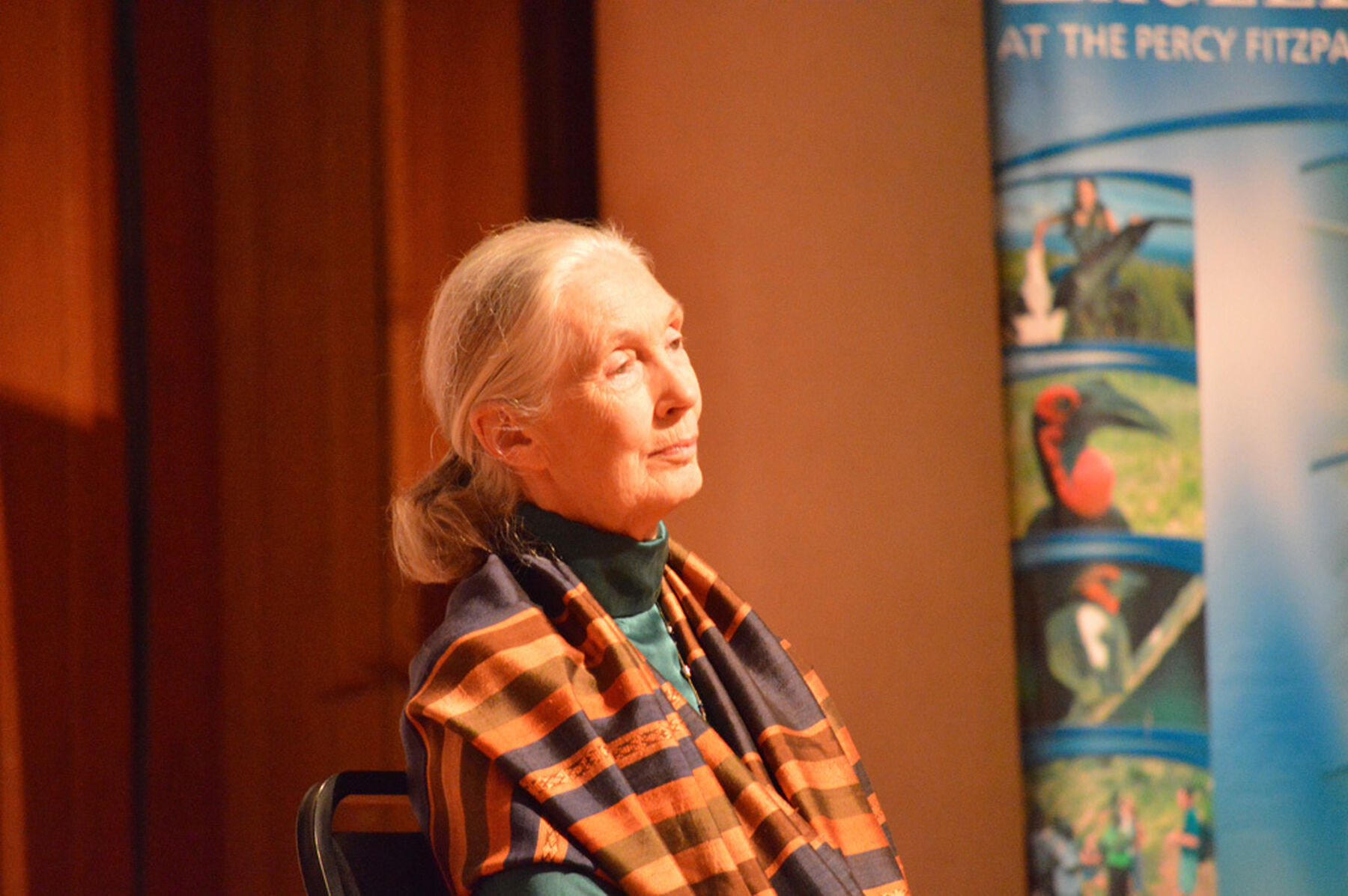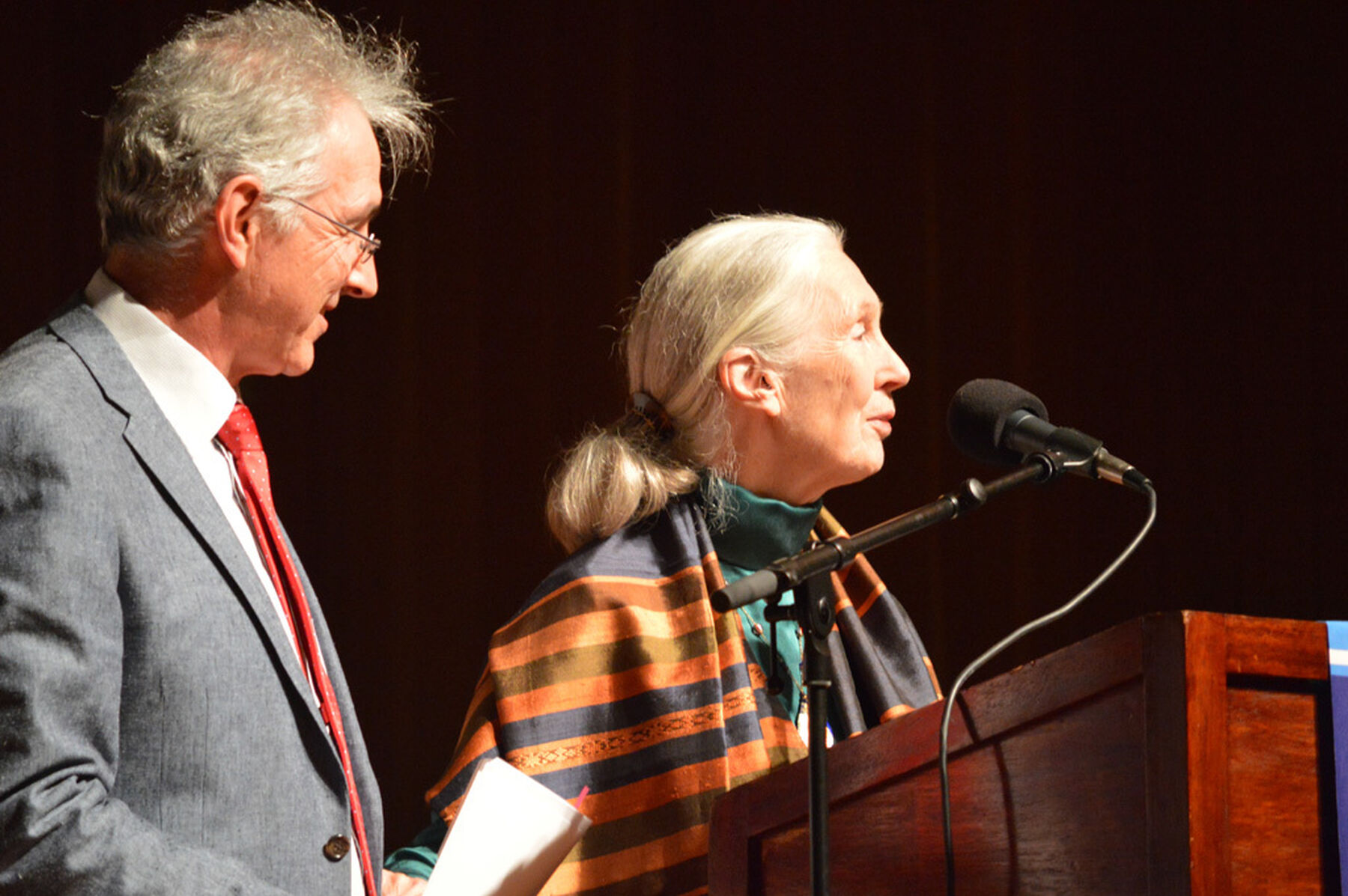At almost 80, Jane Goodall looks great. Her white hair pulled back in a trademark ponytail, dressed simply in an emerald green polo neck and black trousers with a pashmina thrown over her shoulders, her slight figure exudes an air of serenity and quiet determination.
As soon as she takes to the stage at the Baxter Theatre (part of a whistle-stop tour of South Africa) she is quickly in command and gets the University of Cape Town’s (UCT) vice-chancellor, Max Price, to engage in what is clearly her party trick: a demonstration of how a female chimp would greet a male chimp – with calls to match.
Price is a good sport and then Goodall has the floor.
Her topic is a reflection on her life on the eve of her 80th birthday (in April 2014). She knows that in the audience there are many students who still have a fire in their belly and it is to them that she addresses herself.
Here are some life lessons from her wide-ranging talk.
Don’t believe that anything is impossible. Her path to international fame was an improbable one. As a young child she dreamed of travelling to Africa and studying animals, but it was just after World War II and her family had no money for tertiary education. Instead, she did a secretarial course on the advice of her mother. When she arrived in Nairobi, Kenya, she went to the National Museum where she sought out palaeontologist Louis Leakey, who hired her as a secretary and ultimately gave her her first big break.
Make time for everyone. Jane Goodall travels an average of 300 days a year because she feels so strongly that she needs to get her message out. Her talk at UCT was on the back of a day spent visiting schools and talking to children.
Treasure your mother. Goodall pays tribute to a mother, who not only went to live with her in Tanzania to allow her to get started on her chimp project, but was unphased by her young daughter bringing a handful of earthworms to bed. Instead, her mother gently explained that the earthworms needed earth or they would die. In the first six months of her chimpanzee project, she said her mother played a vital role keeping her spirits up as the research was painstakingly slow and frustrating.
Read. The first book Jane Goodall remembers reading was Dr Doolittle and she spent many hours browsing through a second-hand bookshop where, as a 10-year-old, she spent her pocket money on a copy of Tarzan and the Apes. She believes this book set her on the path to Africa. In Kenya, Leakey was impressed with her vast knowledge and that is how he came to ask her to go to Tanzania to study chimpanzees to see what they could tell us about human behaviour.
Be brave. She recalls an archaeological trip to the Olduvai Gorge in Tanzania with Leakey and South Africa’s Phillip Tobias where, one evening, a young lion followed herself and her friend all the way back to camp. “It was a little bit scary but also exciting. I do believe that it was that evening around the fire that Leakey asked me if I was prepared to learn about chimps.”
Hold your tongue. It’s easy, says Goodall, to get into a heated argument with an adversary, but once it goes beyond a certain point, neither party is listening to the other. Her mother’s advice is to stop and listen. You may learn something and even agree with your opponent on certain points.

Don’t be intimidated by academics. When she enrolled for a PhD at the University of Cambridge, she did so without having an undergraduate degree. Her supervisor gently guided her through an academic minefield where the prevailing view was that animals did not have an emotional life. But she did not ascribe to that and chimps have subsequently been found to share 98.8% of our DNA. “I had a wonderful teacher as a child. A teacher that taught me the professors were absolutely wrong. That teacher was my dog, Rusty,” she said.
Establish the facts. Goodall positively encourages peaceful activism and engagement, but cautions that before going out on a campaign trail you should establish the facts or else you run the risk of doing great harm to your cause.
Be compassionate. On a flight over Gombe Stream National Park, where she had lived and studied the chimps, she was shocked to see how degraded the area had become and how the forest was being broken up into small patches. That is when she realised that people had to be helped out of poverty before there was a chance of saving other species; so today her charitable work extends to both humans and chimps
Act. It’s easy, says Goodall, to feel overwhelmed in the face of environmental degradation and destruction, and she meets many young people who are depressed and despondent. But the biggest enemy of change is apathy, and she believes even the smallest of actions can bring about good. To this end, her foundation has established a movement called Roots & Shoots, which encourages grassroots activity to make the lives of people better in the poorest of circumstances.

